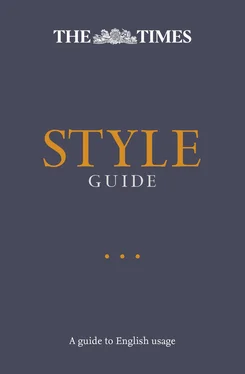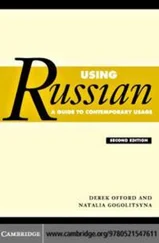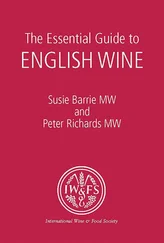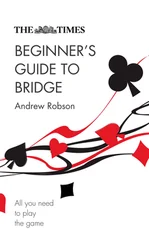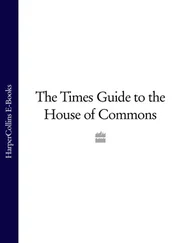Normal style is “Joe Brown, 33, a porter,” but occasional variations such as “Andrew Hunt, who is 74,” are fine. For children’s ages, except in headlines, write out numerals up to and including ten: “Emma Watson, seven, who …”, “Emma Watson, who is seven”, “Emma Watson, aged seven”, “the seven-year-old Emma Watson” etc. For consistency, however, use figures for both numerals if one is lower than ten and one higher so, eg “children aged 5 to 14” (not “five to 14”). In headlines, numerals save space and may often be clearer: “Children aged 7 are victims of school sexting epidemic.” For more general ages use lower case decades, ie “I wish I was still in my thirties” etc.
Note caps in Ice Age, Stone Age , the Dark Ages etc
aggravatemeans to make (an evil or complaint) worse. It does not mean to annoy or irritate
AGMcaps, but prefer annual meeting in text
ahead ofdo not use in the sense of timing to mean before/prior to/in advance of
aide-memoireroman, hyphen, no need for accent; plural aidesmemoire . Traditionally minded French speakers might prefer the plural to be aide-mémoire; aide is a verb, not a noun, and there is still only one mémoire being aided, so the form is invariable; since the French spelling reform of 1990, however, the tendency has been to treat such composites as simple nouns and add an s at the end of all of them, so most younger French people would probably write aide-mémoires. All this is academic; aide-memoire has been anglicised through common use (no accent, no italics, no attempt at French pronunciation); in the process it has acquired various more or less awkward English plurals, of which the most widely accepted seems to be aides-memoire; this may be poor French, but it is comprehensible English, and if it is good enough for Collins, the OED and the National Archives (where British government and diplomatic aides-memoire are catalogued and stored), it should be good enough for us
Aids(acquired immune deficiency syndrome) is not a disease, but a medical condition. Diseases that affect people who are HIV-positive may be called Aids-related diseases ; but through custom and practice we can now afford to relax our rule about never saying “died of Aids”. Write HIV/Aids when appropriate regarding the virus and the condition together
airbase, airstrip, airspaceno hyphens
air conditioner, air conditioningno longer hyphenate as noun; but hyphenate adjectivally, eg an air-conditioning unit
aircraftprefer to planes wherever possible. Remember that not all aircraft are jets, some are still turbo-prop. Do not use the American airplanes
aircraftman, aircraftwomannot aircraftsman etc
aircraft namesare italicised, like ship or locomotive names, on the rare occasions when they are needed, eg the Enola Gay (Hiroshima bomber)
aircraft typesB-52, F-111 etc (roman, hyphens between letter and numbers just because it looks neater)
air farestwo words, as rail fares, bus fares etc
air forcecap Royal Air Force (thereafter the RAF), otherwise all lower case: the US air force (USAF, or in Second World War contexts USAAF), Brazilian air force; and lower case in adjectival use, eg an air force raid. No hyphen, even adjectivally
airplaneugly Americanism; do not use
airportsas a general rule for British airports, use the name of the city or town followed by lower case airport, eg Manchester airport, Leeds/Bradford airport, East Midlands (formerly Nottingham) airport, Luton airport; but Heathrow, Gatwick, Stansted are fine on their own
air raidtwo words (unlike airstrike)
air showtwo words; lower case even when specific, eg the Paris air show, the Farnborough air show
airstrikeone word in military sense, but air raid (two words)
AK47no need to hyphenate the Kalashnikov assault rifle
akimbouse only with reference to arms (never legs). It means hands on the hips with elbows turned outwards
al-as the prefix to Arabic nouns (including names), prefer the al - to the el- form, except where the el- has become widely accepted. The prefix is dropped from names at second mention, so that Bashar al-Assad becomes Assad
Albert Hall, theprefer to give Royal at first formal mention (that is its name); subsequently (or informally) fine without
alcoholits strength is measured either by volume (a percentage) or by the more traditional proof system, of which there are British and American variants. Do not confuse the percentage and proof systems by writing, eg that a drink is 48 per cent proof. As an example, a spirit that is 40 per cent alcohol by volume (ABV) is 80 degrees proof on the American scale (which runs from 0 to 200, and the proof number being precisely double the ABV figure); on the old British scale, which runs from 0 to 175, 40 per cent ABV would be 70 degrees proof. On the British scale, 100 degrees proof spirit (57.1 per cent ABV) is the minimum strength of distilled alcohol that when mixed with gunpowder sustains its combustion, and this property was used to test the traditional rum ration in the British navy. Since 1980 Britain has used the ABV system. See drink-drive
A levelno hyphen as a noun, but A-level results etc (hyphenate when adjectival). A levels now embrace AS levels and A2s, and can still be used as the generic phrase and in historical context. But use O levels (same hyphenation rules) now only in historical context
alfrescoone word, roman
algebratake great care in writing and presenting algebraic expressions. Individual terms should be in italics. Be sure that superscripts, including squares of numbers, and subscripts are properly rendered, eg E=mc 2. As an example in narrative text: “Dr Edwards noted that the mass, m , is proportional to Ax where A is the area of the burger and x is its thickness. If all other parameters remain the same (heat of grill, absence of sudden downpour, mood of cook and so on), then t , the total cooking time, is proportional to x 2 A .” See italics
alibinot a general alternative to excuse; it means being elsewhere at the material time
Alistairalways check the spelling of this name (Alastair, Alasdair, Alister etc)
allin phrases such as “all the president’s men” there is no need to write “all of the president’s men”
Allahu akbar(God is greatest); note also alhamdulillah (“praise God”, approximately equivalent to the Judaeo-Christian alleluia/hallelujah)
allcomersone word
allegeavoid the suggestion that the writer is making the allegation; somewhere in the story always specify the source. Do not assume that use of this verb will keep you out of legal trouble; if in doubt, ask a lawyer. Do not use alleged as a synonym of ostensible, apparent or reputed
All Hallows Evenot Allhallows
Alliescap the Allies in the Second World War context; generally, lower case alliance , as in the Atlantic alliance, Gulf War alliance etc
all rightnever alright, except in the television programme It’ll be Alright on the Night
Читать дальше
